Contents:
If you’re in the market for a remote monitoring and management (RMM) solution, finding the right fit can be challenging, and exploring Atera alternatives is a great place to start.
As one of the leading tools on the market, there are some good reasons to choose Atera.
In this article, we discuss the key benefits and drawbacks of Atera, as well as the seven competitors and alternatives.
Why Should I Consider an Atera Alternative as an MSP?
Atera is one of the best-known RMM solutions on the market.
It aims to provide a comprehensive approach to IT management for managed service providers (MSPs) and IT professionals.
But for many others, the promise often fails to deliver, for a number of reasons such as reporting, coverage, monitoring, and pricing.
Reporting
Many users have mentioned that the reporting functionality is limited and difficult to use.
Comprehensive coverage.
Users looking for wide support should consider one of the alternatives on this list.
Mobile device support is not available for iPads and iPhones, which can be a key challenge for organizations that rely on these devices.
Monitoring
User reviews suggest that the Atera platform can be difficult to use and the UI is not as intuitive as other competitors.
Pricing
Atera has an ‘innovative’ pricing model, where organizations pay per technician.
This is in contrast to the standard RMM pricing model, where companies are charged according to the number of endpoints they’re monitoring.
Top Atera Alternatives
If you’re looking for an RMM product, you should absolutely consider what alternatives might better suit your business and requirements.
1. Heimdal®

The best cybersecurity product available to consumers. I’ve tested virtually every cybersecurity package available, with varying results. One day, I was recommended Heimdal – I tried it and never looked back.
I once made a mistake with my license details and the support team resolved my issue immediately. They’re not only high on security but also high on customer support.
Heimdal® is one of the most advanced and widely adopted cybersecurity tools on the market today.
Unlike many of the contenders on this list, Heimdal isn’t a traditional RMM platform.
For many MSPs, however, this is a key benefit – because it allows for a unified, integrated approach to your remote network management system.
MSPs have traditionally flocked to RMM software as the go-to technology to help monitor and manage client environments and devices.
But here’s the problem. These tools can often end up being siloed.
Companies might have multiple different siloed tools for each client, depending on the specific endpoints and systems requiring protection.
The more complex the environments being managed, the more likely it is you’ll need to bring in other features and solutions to supplement your RMM product.
Regardless of whether you’re monitoring your own environment or your clients’, it offers a single portal for all your cybersecurity needs.
This makes it easier for you to effectively manage the whole scope of security threats your clients might face.
But that’s not the only challenge with traditional RMM products.
Often, they are sold through third-party vendors with varying levels of support, as well as network and service quality.
But with Heimdal®, customers always have a single, in-house contact for support, making it much easier to offer effective network performance management services for your customers and clients.
This is why we think Heimdal® is by far the best solution on the market – and why we’ve put it at the top of this list.
Key Features
- Network security. Including DNS security and network cloud ransomware protection.
- Endpoint security. Secure yours and your clients’ devices through DNS security, next-gen antivirus, and MDM ransomware encryption protection.
- Vulnerability management. Make patch management a breeze with our integrated patch and asset management suite.
- Privileged access management. A single platform to access privileged access management (PAM), privilege elevation and delegation management (PEDM), and session management application control (SMAC).
- Email and collaboration security. Secure tools to help govern and manage email security, particularly to protect against phishing and fraud.
- Threat hunting. Detect the biggest weaknesses in your environment and manage real-time security events.
- Unified endpoint management. Manage all devices from one location, no matter where the user is or how they’re logging in.
Pros
- A unified approach. Access a single cybersecurity platform for all your needs, including vulnerability management, network security, firewalls, privileged access, and much more.
- No 3rd-party support. All customers have a single dedicated Heimdal® contact for support, with no need to rely on 3rd parties.
- Wide functionality. Heimdal® offers a broad range of cybersecurity features, including traditional RMM functionality, as well as firewalls, vulnerability management, email security, and much more.
Cons
- Hardware. Heimdal® currently lacks some functionality to manage hardware insights and alerts.
Pricing
Heimdal pricing varies depending on the size of the company, the number of endpoints being monitored, and which cybersecurity modules are being used.
Customers can try the platform for free and then receive a bespoke pricing package from our sales team.
2. ConnectWise Automate
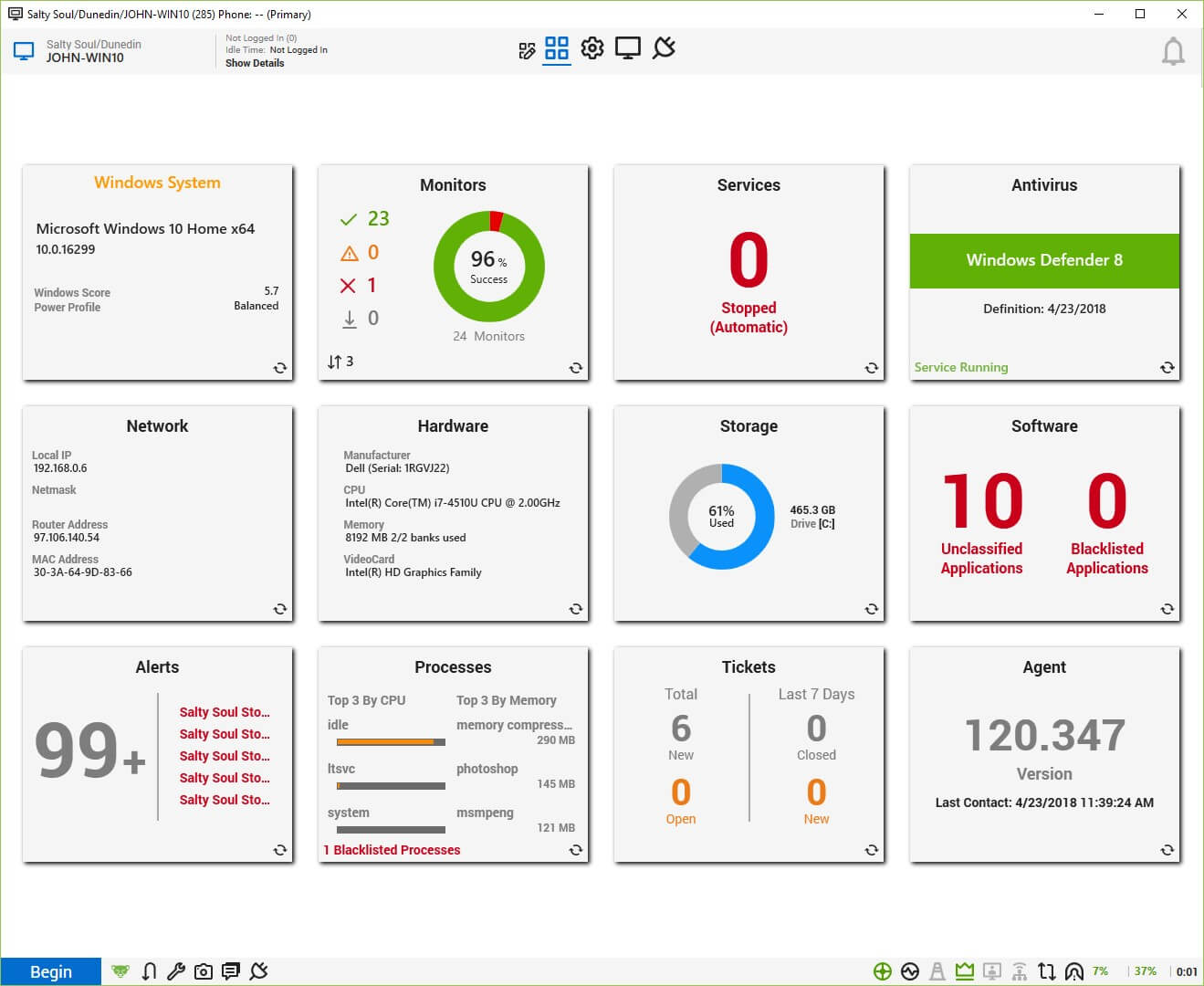
ConnectWise is among the most well-established brands in the RMM space.
Indeed, having been formed in 1982, it has a longer heritage than most tech brands altogether.
The company specializes in a range of IT service management software and products, aimed specifically at managed service providers (MSPs).
ConnectWise Automate is the company’s most well-known tool, though there are many other features and packages available in parallel products.
The company aims to offer a broad set of functionality and integrations.
Though the features are comprehensive, the UI is often described as outdated and difficult to use.
Key features
- Asset discovery.
- Endpoint management.
- Patch management.
- Remote and automated monitoring.
- AI scripting assistance.
Pros
- Integrations. ConnectWise Automate offers a broad range of integrations with 3rd-party providers, as well as other ConnectWise products.
- Strong functionality. The product has a comprehensive set of RMM scanning and support features, comparing well to other competitors in the market.
- Consolidated approach. ConnectWise brings automation, support, networking, and more into a unified IT platform.
Cons
- User interface. User reviews suggest that the ConnectWise platform can be difficult to use and the UI is not as intuitive as other competitors.
- Learning curve. The breadth of functionality in the platform can make it difficult for users to quickly get to grips with.
- Patching and reporting. These features are often cited by users as a drawback, with the product lacking robust patch reporting and data views.
Pricing
ConnectWise does not publish pricing publicly, and users are encouraged to contact the sales team.
Testimonials
ConnectWise Automate Pros
+ Automate makes connecting with my users fast and easy. We use it daily to connect with end users to provide troubleshooting support. We also have several scheduled scripts that run across all of our workstations to keep products up to date and improve the quality of life for both our users and our IT staff.
ConnectWise Automate Cons
– The learning curve is a bit steep and there’s some functionality on the client version that isn’t available on the web version, so I end up having both versions up at a time to do everything I need to do.
3. Datto RMM
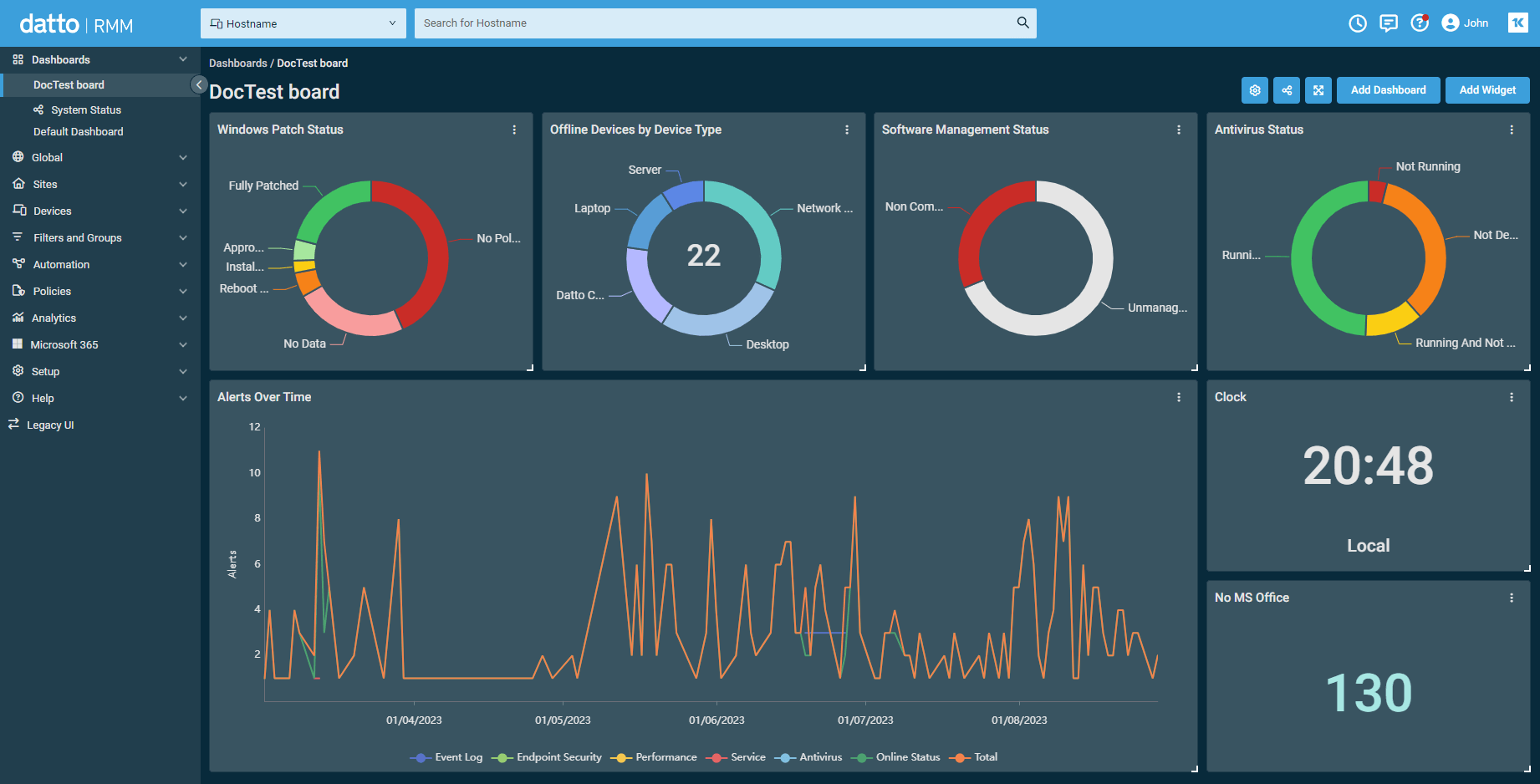
Datto RMM is another popular alternative to Atera. Having been founded in 2007, the company is now a stalwart of the IT scene. Its RMM product takes a cloud-native approach to IT management, with clients particularly praising its remote monitoring capabilities. However, others mention that it’s not the easiest tool to use, and some of the features require clunky workarounds.
Key features
- Network and device monitoring.
- Auto-remediation.
- Patch management.
- Ransomware detection.
- Cloud backup and disaster recovery.
- 24/7 remote support.
Pros
- Remote monitoring. Datto’s RMM capabilities are often cited as among the best in the market, prioritizing quick response and efficiency.
- Wide functionality. The product has a wide set of RMM features and is well suited to the complexities of managing multiple client networks.
- Integrations. There are also a wide range of integrations, both with 3rd-party products and Datto’s own suite of tools.
Cons
- Downtime. Datto experiences a limited but noticeable amount of downtime during updates, which can impact operational effectiveness.
- Configuration settings. Another drawback is the inability to remotely manage configuration settings for individual units, leading to awkward manual workarounds.
- Ease of use. Datto’s UI and functionality are sometimes considered clunky and difficult to use – particularly with features like setup and automation.
Pricing
Datto does not release public pricing information. Instead, MSPs are encouraged to become a partner to receive their own customizable pricing plans.
Testimonials
Datto RMM Pros
+ Easy way to install all software we use in our company or clients companies.
Datto RMM Cons
– Need more training as the initial training is great to start but after time you understand more and need more help.
4. BeyondTrust Remote Support
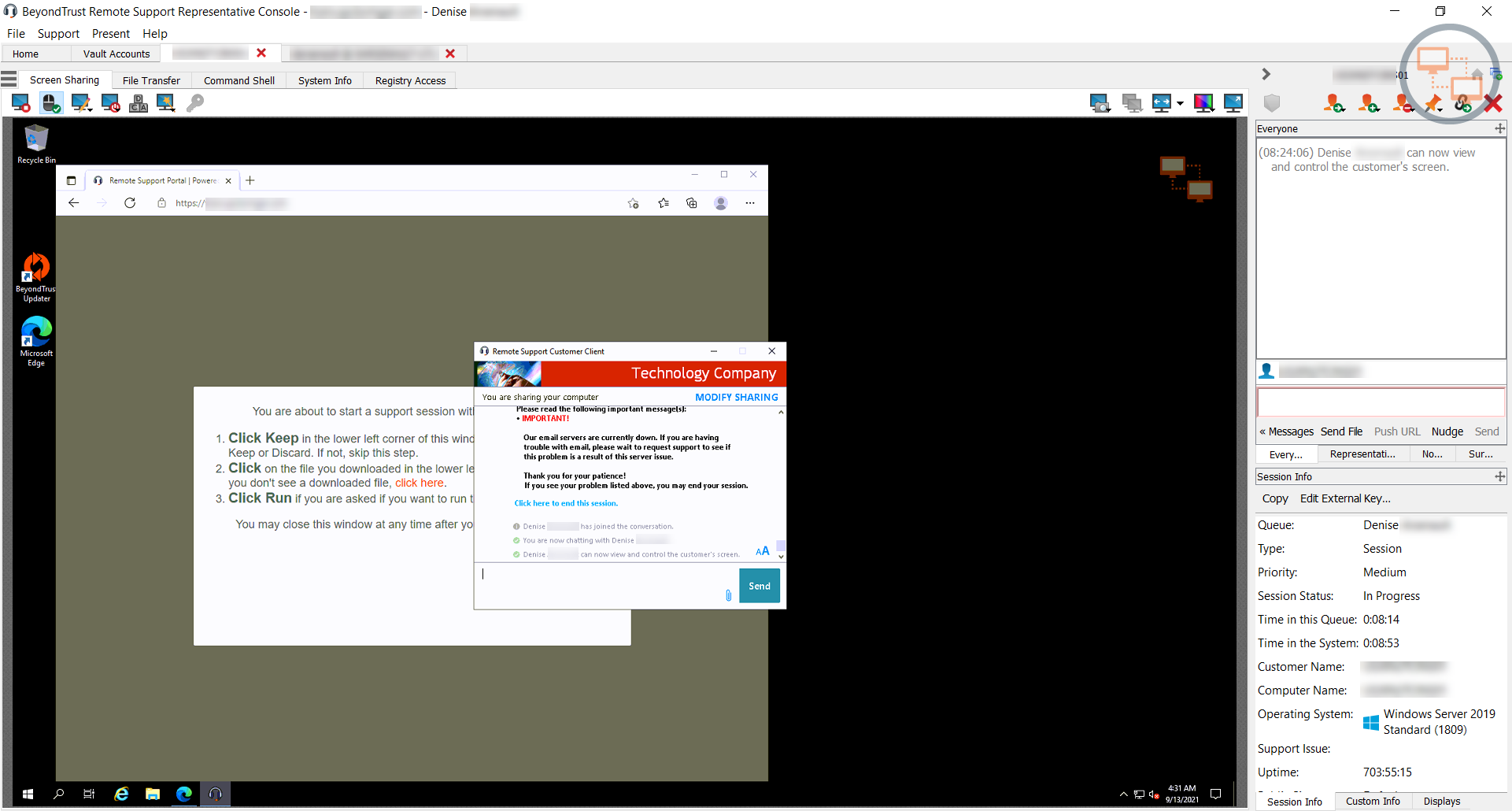
Formerly known as Bomgar, BeyondTrust’s Remote Support is another stalwart of the RMM scene. The product has a wide set of features, as well as strong support and robust integrations.
Remote Support is just one of many cybersecurity solutions that BeyondTrust has on the market.
Generally, these products are designed for large companies or enterprises – and they come with extensive features and support.
On the other hand, the UI and ease of use for these tools is consistently less popular than competitors – and they’re consistently placed among the most expensive cybersecurity products on the market.
Key features
- Remote access and control.
- Team and permissions administration.
- Customization and branding.
- Audit and compliance.
- Wide integrations across CRM, ITSM, SIEM etc.
Pros
- Feature set. Remote Support has an advanced set of RMM features, including remote access, customization, auditing, and more.
- Integrations. BeyondTrust has a wide set of integrations for enterprise-grade software products, including CRMs, ITSMs, SIEMs, and password management tools.
- Documentation. Customers regularly praise the quality and detail of BeyondTrust’s documentation.
Cons
- Ease of use. Users have mentioned that the user interface feels dated, and isn’t as easy to use as many alternatives.
- Pricing. Though pricing isn’t publically available, public reviews suggest Remote Support (like most BeyondTrust products) is among the most expensive in the market.
- iOS Support. BeyondTrust does not support iOS devices, which is a key drawback for some organizations.
Pricing
BeyondTrust does not publically release pricing information. Users are encouraged to contact the sales team to learn more.
Testimonials
BeyondTrust Pros
+ The ease of use for our support agents means minimal training is required for using BeyondTrust though we have invested in BeyondTrust training from BTU.
Integration with our ServiceNow ITSM system also streamlines the support process for our support agents.
Lastly, having the security of knowing that our data is safely encrypted and controlled gives our Information Security team comfort as opposed to using less secure services to provide support in our healthcare environment.
BeyondTrust Cons
– It gets hung sometimes and a bit bit complex for initial configuration.
5. N-able N-central

Billed as N-able’s ‘flagship’ RMM product, N-central is another popular RMM product. Until recently, it was called SolarWinds N-central.
N-central aims to help customers manage, secure, and backup their IT environments at scale – across cloud, on-premises, and hybrid environments.
The product also offers various automation features to simplify overall IT and security management.
While users appreciate the strong feature-set and clear roadmap, others highlight the lack of integrations as a key drawback.
Key features
- Auto discovery.
- Alerting and reporting.
- Patch management.
- Endpoint security.
- Password management.
- Microsoft 365 backup.
- Automation.
Pros
- Strong feature set. Users praise N-central for its robust set of features, with remote connectivity and patch management tools being particular highlights.
- Clear roadmap.. N-able continually invests in new features and functionality and is transparent about what upcoming changes users can expect.
- Support. N-able’s customer support is also a key highlight for users, who praise the knowledge and responsiveness of the CS team.
Cons
- Integrations. One of the most common issues with the N-able N-central product is the number of integrations, which are noticeably fewer than other platforms.
- Remote access. Features such as remote access, discovery, and patch management are considered less effective than other competitors.
- Learning curve. Though N-able N-central is an effective product, users report a steep learning curve when they first start using it.
Pricing
N-able does not release pricing information for the N-central product. Users are encouraged to sign up for a free trial via the website.
Testimonials
N-able N-central Pros
+ I like the fact it is a centralised platform for monitoring, managing and securing our IT networks.
The usability of the product helps me and my team ensure we are delivering the best possible customer support to our clients.
It comes with many integrations such as IT Glue which we also use. We use this every day, all day.
From the moment we adopted the product, it was super clean to implement. We couldn’t be happier.
The support we get as well when our engineers need help is fantastic.
N-able N-central Cons
– Whilst the tools are the best feature of N-central, the command line tool can be temperamental, particularly when switching to PowerShell, whereby some output does not display correctly (the shell window outputs black text against the black background, making it unreadable unless you highlight it or export the session to a text file).
6. Syncro
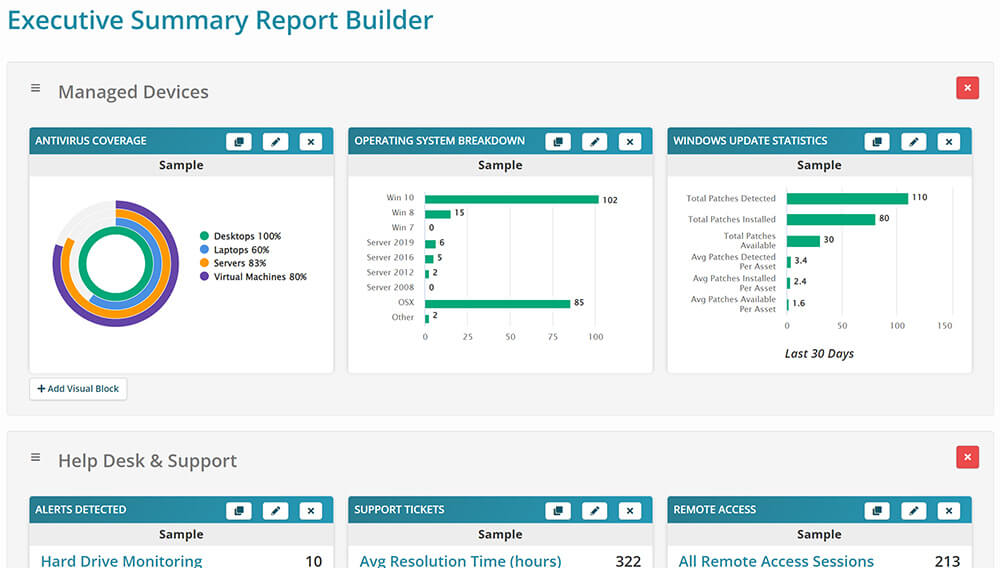
Syncro describes itself as the ‘integrated business platform for running a profitable MSP’.
It aims to be a robust business management platform as well as offering the standard RMM feature-set.
PSA features are designed to help MSPs automate some of their own business processes, making it easier to provide effective managed services to clients.
Key features
- Endpoint management.
- Incident management.
- Vulnerability scanning.
- Continuous monitoring.
- Application security.
- Device management.
- Web threat management.
Pros
- Simple pricing. Unlike many companies on this list, Syncro’s pricing is transparent and straightforward, with a single flat per/user fee for all features.
- Simplicity. Users appreciate how easy Syncro is to use and how quickly new users can get started.
- RMM + PSA. The combination of RMM and PSA functionality is another key draw for MSPs, since it avoids the need to invest in multiple solutions.
Cons
- Customization. Syncro offers fewer options for customization than some competitors. This means it might be less well-suited to large or complex organizations with unique requirements.
- Support responsiveness. Though users generally praise the quality of Syncro’s customer service, the speed of response has been noted as one key drawback.
- Device support. Syncro isn’t available for Linux and doesn’t support iPad, iPhone, or Android devices. It is also not available for on-premises environments.
Pricing
All Syncro customers pay either a flat rate of $129 per user/month (billed annually) or a monthly rate of $139 per user/month.
Testimonials
Syncro Pros
+ Syncro meets most of the requirements I am looking for in both an RMM and PSA tool. I find that it is easy to keep track of devices, work, and inventory. Then relate those items directly to an invoice, estimate or contract.
Syncro Cons
– Some of the tools/features are a little hard to get to grips with, and sometimes you have to do many pre-requisite settings on other pages before you can setup the feature you want.
7. Pulseway
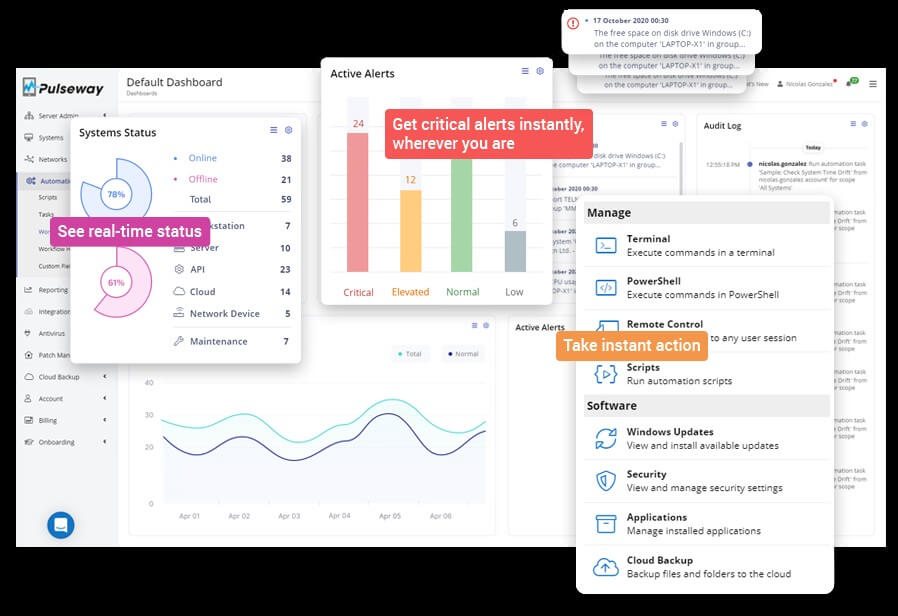
Unlike many competitors, Pulseway takes a remote-first approach to its suite of RMM features.
This means it has a particularly advanced set of mobile device management and remote systems capabilities.
It also has wider support than most of the products listed here, including Windows, Linux, Mac, iPad, Android, iPhone, and more.
Pulseway’s pricing is also another key differentiator.
They offer a transparent pricing scale based on the number of endpoints being monitored, with other add-ons being available depending on the needs of the organization.
Key features
- Mobile app.
- Remote control.
- Network monitoring.
- Patch management.
- IT automation.
- Self-service portal.
- Server application monitoring.
Pros
- Remote management. Pulseway has an advanced set of remote and mobile device management capabilities, as well as wide support across mobile devices.
- Simple to use. Users regularly praise Pulseway’s intuitive UI and ease of use.
- Integrations. Pulseway has a wide set of integrations with tools like Slack, Jira, and Zendesk.
Cons
- Mobile-first. The mobile-first approach to RMM might not be ideal for organizations with more traditional or on-premises IT environments.
- Reporting and notifications. Some users point out that the reporting and notification features in this product aren’t as advanced as some competitors.
- Customization. Pulseway’s product also doesn’t offer the ability to create customized reports, which is often cited as a drawback.
Pricing
Pulseway has a transparent, tiered pricing system, which can be viewed on the website.
Testimonials
Pulseway Pros
+ I’ve been using Pulseway for about 10 years in various environments.
Originally, I used it for remote server monitoring and alerts.
In recent years I’ve also branched out into monitoring workstations as well to help with support and OS/3rd Party Patch Management.
It’s always reliable, super easy to install/setup/deploy and the interface and UX is fantastic.
Pulseway Cons
– The mandatory onboarding.
It’s not necessarily bad, but I could see it being off-putting for others when they initially see it on their first invoice.
Perhaps they could offer it as a separate service.
Frequently Asked Questions (FAQs)
What is an RMM product?
RMM stands for remote monitoring and management. The technology is often used by managed security service providers (MSSPs) to secure and support the IT environments and endpoints of their clients.
What are the best Atera alternatives?
Though Atera is one of the most well-known products on the market, it’s far from the only option. In fact, there are as many as 50 alternatives. Some of the most well-known of these include Heimdal, Pulseway, Syncro, ConnectWise, and Datto.
Why should I consider an Atera alternative?
There are many great reasons to consider Atera alternatives. Some users report that the reporting and monitoring capabilities are less advanced than with competitors. Others find Atera’s unique pricing model to be a drawback.
If you liked this article, follow us on LinkedIn, Twitter, Facebook, and Youtube, for more cybersecurity news and topics.










 Network Security
Network Security
 Vulnerability Management
Vulnerability Management
 Privileged Access Management
Privileged Access Management  Endpoint Security
Endpoint Security
 Threat Hunting
Threat Hunting
 Unified Endpoint Management
Unified Endpoint Management
 Email & Collaboration Security
Email & Collaboration Security










